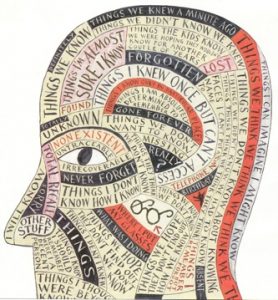 Yesterday I talked about a This American Life podcast, Tell Me I’m Fat, but the buzzer went off and I did not really explain how it related to our topic of teaching white people about racism. I felt uncomfortable talking about this podcast because I felt like it might be offensive to some people but, I also felt like the story really illustrated how blind we can be to the effects of prejudice and racism.
Yesterday I talked about a This American Life podcast, Tell Me I’m Fat, but the buzzer went off and I did not really explain how it related to our topic of teaching white people about racism. I felt uncomfortable talking about this podcast because I felt like it might be offensive to some people but, I also felt like the story really illustrated how blind we can be to the effects of prejudice and racism.
We see the world through our own personal filter, which is colored by our limited background and experiences. After Elna lost weight it was like she was able to experience a completely different reality. She was suddenly able to step into this parallel universe where doors that were usually closed to her were now open. People that ignored or criticized her now openly embraced her.
Similarly, White people have no clue that there really is this parallel universe where the rules that govern their life –the social constructs that allow for their upward mobility and smile favorably upon them- do not apply.
I listened to another podcast about what it takes to change people’s minds on controversial subjects like same sex marriage or abortion. What they found was that going door-to-door inundating people with information did not work at all. What really got people to change their minds was an open dialogue. The canvasser would ask a person about their opinion on abortion or same sex marriage and then they would listen- not passing judgment or trying to counter with statistics or reason, but instead asking probing questions, encouraging the person to explore and actually articulate their own thinking. The responses they got were overwhelming. Most of the people that they engaged in this way had changed their minds by the end of the conversation. And even months later, had not gone back to their old opinions.
So how do we teach white people about racism? We need to get them to articulate their thinking. Going through this metacognitive process is not an easy task. It takes a lot of time and patience. But as teachers, we can find ways to start these conversations within our classrooms and our communities. We just need to be wary of complacency. As many of our classmates mentioned in their presentations, if you get to a point where you think you’re done, you’ve got a problem.
It’s incredibly how easy it is to miss all the subtle, interwoven discrimination built into the fabric of our society. Its a lot of work to stay honest and keep sharing the truth.
Hiding in plain site. When you live it and it is part of your fabric two things are often true. One you don’t realize you have mustard on your shirt and two its hard to get the stain out of there when you do.
I also listened to the radio show about the lady that lost a lot of weight that you mentioned on Monday. I heard it on Saturday on KTOO radio. I knew what you were talking about right away and I knew where you were going. It was a good analogy. I think that what you recommend as a way to teach white people about racism is an interesting idea. I’m sure it could work with some people.
Hi, Shannon!
Thank you for delving further into the fantastic connection you made with a different aspect of differed reality the other day. That story helped me understand what it would be like to experience life from someone else’s perspective. I particularly liked when you talked about the concept of a “parallel universe” in this post- we need to open our eyes to this parallel universe found in so many people’s lives!
Thanks for your thoughts, Shannon. I enjoyed hearing you speak up in class– and I, too, wondered if your words would offend anyone. – Which is part of uncomfortable topics being uncomfortable and needing to be brought up.
I like your idea of breeching these subjects with questions. Not telling people what is right or wrong, but by helping them to articulate why they feel the way they do, validating their words– and in that way not being a door to door salesman, but a door to door listener, human and change-maker.
Shannon- wow this post is really awesome. I’m glad I came back to see where you were going with the story your shared in class about Elna. Bringing up these issues is absolutely necessary. I think you are right–we must find ways to talk about this so as to really bring about change in society. Also I agree about allowing people to talk without interruption so that they are able to crystalize their thoughts. Interrupting others is something I saw happening in the classroom when we were proofing our iBooks for content and it is getting us nowhere and it really shows how much people are only thinking about themselves and their own agendas. We have been conditioned to be so competitive. I think learning to truly listen to others and giving them the time and courtesy to speak and to actually listen is just the beginning of something much larger.